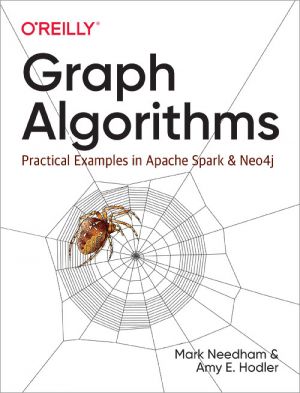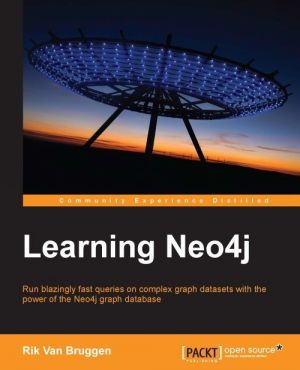Learning Neo4j
Run blazingly fast queries on complex graph datasets with the power of the Neo4j graph database
by Rik Van Bruggen
DescriptionTable of ContentsDetailsHashtagsReport an issue
Starting with a brief introduction to graph theory, this book will show you the advantages of using graph databases. Following on from that, you will be introduced to Neo4j and you will be shown how to install it on various operating systems. You will then be shown how you can model and import your data into Neo4j.
This book has two use case examples that will show you how to model and implement a graph in Neo4j by analyzing a user case, and analyze the impact a change has on a process or a system. You will also gain an insight into graph visualization options and discover external sources where you can learn more about this exciting and popular graph database.
Background and specifications of graph databases; Install Neo4j on a variety of different platforms, locally and in the cloud; Model data for a graph database such as Neo4j; Import data into Neo4j; Learn about sample use cases for Neo4j; Discover the advantages of graph databases versus other database models; Find out where you can find additional information on Neo4j. 






Book Description
Neo4j is the world's leading graph database and offers users a radical new way of dealing with connected data. This book has been created to help you get to grips with it, providing you with an accessible route through a tool built to contend with the complexity of modern data. Learn the fundamental concepts behind Neo4j, and put them into practice by following the featured examples and use cases that demonstrate how to apply your knowledge to real problems.Starting with a brief introduction to graph theory, this book will show you the advantages of using graph databases. Following on from that, you will be introduced to Neo4j and you will be shown how to install it on various operating systems. You will then be shown how you can model and import your data into Neo4j.
This book has two use case examples that will show you how to model and implement a graph in Neo4j by analyzing a user case, and analyze the impact a change has on a process or a system. You will also gain an insight into graph visualization options and discover external sources where you can learn more about this exciting and popular graph database.
Background and specifications of graph databases; Install Neo4j on a variety of different platforms, locally and in the cloud; Model data for a graph database such as Neo4j; Import data into Neo4j; Learn about sample use cases for Neo4j; Discover the advantages of graph databases versus other database models; Find out where you can find additional information on Neo4j.
This open book is licensed under a Creative Commons License (CC BY). You can download Learning Neo4j ebook for free in PDF format (13.1 MB).
Table of Contents
Preface
Chapter 1
Graphs and Graph Theory - an Introduction
Chapter 2
Graph Databases - Overview
Chapter 3
Getting Started with Neo4j
Chapter 4
Modeling Data for Neo4j
Chapter 5
Importing Data into Neo4j
Chapter 6
Use Case Example - Recommendations
Chapter 7
Use Case Example - Impact Analysis and Simulation
Chapter 8
Visualizations for Neo4j
Chapter 9
Other Tools Related to Neo4j
Appendix A
Where to Find More Information Related to Neo4j
Appendix B
Getting Started with Cypher
Book Details
Title
Learning Neo4j
Subject
Computer Science
Publisher
Packt Publishing
Published
2014
Pages
222
Edition
1
Language
English
ISBN13 Digital
9781849517164
ISBN10 Digital
1849517169
PDF Size
13.1 MB
License

Related Books

Learn how graph algorithms can help you leverage relationships within your data to develop intelligent solutions and enhance your machine learning models. With this practical guide, developers and data scientists will discover how graph analytics deliver value, whether they're used for building dynamic network models or forecasting real-world ...

This book presents a synopsis of six emerging themes in adult mathematics/numeracy and a critical discussion of recent developments in terms of policies, provisions, and the emerging challenges, paradoxes and tensions. It also offers an extensive review of the literature adult mathematics education. Why do adults want to learn mathematics? Did they...

This book summarizes the vast amount of research related to teaching and learning probability that has been conducted for more than 50 years in a variety of disciplines. It begins with a synthesis of the most important probability interpretations throughout history: intuitive, classical, frequentist, subjective, logical propensity and axiomatic vie...

It argues that the main purpose of educational research is to improve student learning, and that international comparative studies are no exception....

This book provides a systematic overview of experiences with Inquiry-Based Learning (IBL) and undergraduate research (UR) in German universities, covering both research universities (Universitäten) and universities of applied sciences (Fachhochschulen). Divided into three parts, the book starts with the principles and common practices of IBL/UR at...

This book deals with the relevance of recognition and validation of non-formal and informal learning in education and training, the workplace and society. In an increasing number of countries, it is at the top of the policy and research agenda ranking among the possible ways to redress the glaring lack of relevant academic and vocational qualificat...

